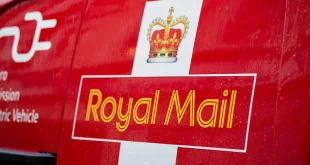Royal Mail has announced a 30p increase in the price of a first class stamp, explaining the “urgent” financial challenge it faces.
The price of first class stamps will increase to £1.65 on October 7 while second class stamps will remain at 85p.
First class stamp prices increased by 10p to £1.35 in April and by 10p to 85p for second class.
Royal Mail said it has sought to keep price increases as low as possible in the face of declining letter volumes, inflationary pressures and the costs associated with maintaining the so-called Universal Service Obligation (USO) under which deliveries have to be made six days a week.
Postal regulator Ofcom said this week that Royal Mail could be allowed to drop Saturday deliveries for second class letters under an overhaul of the service.
Ofcom said no decision had been made and it continues to review the changes, with aims to publish a consultation in early 2025 and make a decision in the summer of next year.
Royal Mail said letter volumes have fallen from 20 billion in 2004/5 to around 6.7 billion a year in 2023/4, so the average household now receives four letters a week, compared to 14 a decade ago.
The number of addresses Royal Mail must deliver to has risen by four million in the same period meaning the cost of each delivery continues to rise.
Royal Mail said the universal service is in need of urgent reform, adding: “The minimum requirements of the universal service haven’t changed for over 20 years despite major changes to how people communicate.
“We have no certainty on regulatory reform and the rate of letter decline and ongoing losses means that Royal Mail has had to take the necessary steps within its power to address the very real and urgent financial sustainability challenge the universal service faces right now.
Nick Landon, Royal Mail’s chief commercial officer, said: “We always consider price increases very carefully. However, when letter volumes have declined by two-thirds since their peak, the cost of delivering each letter inevitably increases.
“A complex and extensive network is needed to get every letter and parcel across the country for a single price – travelling on trucks, planes, ferries and in some cases drones before it reaches its final destination on foot. We are proud to deliver the universal service, but the financial cost is significant.
“The universal service must adapt to reflect changing customer preferences and increasing costs so that we can protect the one-price-goes anywhere service, now and in the future.”
Source link



